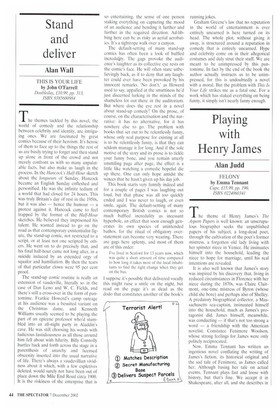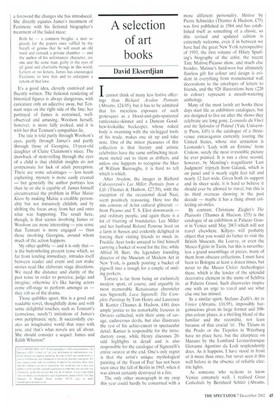Playing with Henry James
Alan Judd
FELONY by Emma Tennant Cape, £15.99, pp. 190, ISBN 0224060341 The theme of Henry James's The Aspem Papers is well known: an unscrupulous biographer seeks the unpublished papers of his subject, a long-dead poet, through the cultivation of the poet's former mistress, a forgotten old lady living with her spinster niece in Venice. He insinuates himself into the household, leading the niece to hope for marriage, until his real intentions are revealed.
It is also well known that James's story was inspired by his discovery that, living in reduced circumstances in Florence with her niece during the 1870s. was Claire Clairmont, one-time mistress of Byron (whose child she bore) and perhaps also of Shelley. A predatory biographical collector, a Massachusetts sea-captain, insinuated himself into the household, much as James's protagonist did. James himself, meanwhile, was conducting — if that's not too strong a word — a friendship with the American novelist, Constance Fenimore Woolson, whose strong feelings for James were only politely reciprocated.
Now, Emma Tennant has written an ingenious novel conflating the writing of James's fiction, its historical original and the sad tale of Fenimore, as James called her. Although basing her tale on actual events, Tennant plays fast and loose with history, but that's fine. We accept it in Shakespeare, after all, and she describes in a foreword the changes she has introduced. She directly equates James's treatment of Fenimore with his fictional biographer's treatment of the faded niece:
Both he — a common burglar, a man so greedy for the papers once ruffled by the breath of genius that he will court an old maid and ransack a private chamber — and the author of his unfortunate character, are one and the same man, guilty in the eyes of all good and charitable beings in this world. Letters or no letters, James has encouraged Fenimore to love him and to anticipate a return of that love,
It's a good idea, cleverly contrived and fluently written. The fictional rendering of historical figures is always dangerous, with caricature only an adjective away, but Tennant stays on the right side of the line; her portrayal of James is restrained, wellobserved and amusing. Woolson herself, however, is more fully evoked, and it is with her that Tennant's sympathies lie.
The tale is told partly through Woolson's eyes. partly through James's and partly through those of Georgina, 13-year-old daughter of Claire Clairmont's niece. The drawback of story-telling through the eyes of a child is that childish insights do not compensate for lack of adult perception. There are some advantages — less needs explaining, mystery is more easily created — but generally the author portrays less than he or she is capable of. James himself circumvented the problem in What Maisie Knew by making Maisie a credible personality but not intrusively childish, and by shifting the focus away from her and onto what was happening. The result here, though, is that scenes involving James or Woolson are more interesting — you sense that Tennant is more engaged — than those involving Georgina, around whom much of the action happens.
My other quibble — and it is only that — is the buttonholing present tense which, so far from lending immediacy, intrudes itself between reader and event and can make stories read like elaborate stage directions. We need the distance and clarity of the past tense in order to perceive, judge and imagine; otherwise it's like having actors come off-stage to perform amongst us — they rob us of the drama.
Those quibbles apart, this is a good and readable novel, thoughtfully done and with some delightful touches, such as Tennant's (conscious, surely?) imitations of James's own periphrastic style. It successfully creates an imaginative world that stays with you, and that's what novels are all about. She should consider a sequel: James and Edith Wharton?
DA FA PROIECTION .ACT. When responding to offers and pcomotioits Spectator I tOrt. Limited gill cse your information for adnirmeirotion, tooter senores wig targeted marketing. In order no Lund our commitments to
you ice '4111 die.true 111fOrMat101 to our seri ice pow idens .,rd agents. We man contact you by mail. this Telephone or email to lei you know ahem other Spectator. nroinuty so, ice, in promotionr. We would also like to pros your details to other earchill> selected organisations in order that they eon offer you information_ goods aml sercieas that may he of interest. If you would prefer that your details are not parted to ouch organisations. please write to he Data Manager. 56 Doughty Street. London WCIN i:LL. or email datamonagengS112,1A...r.k.











































































 Previous page
Previous page